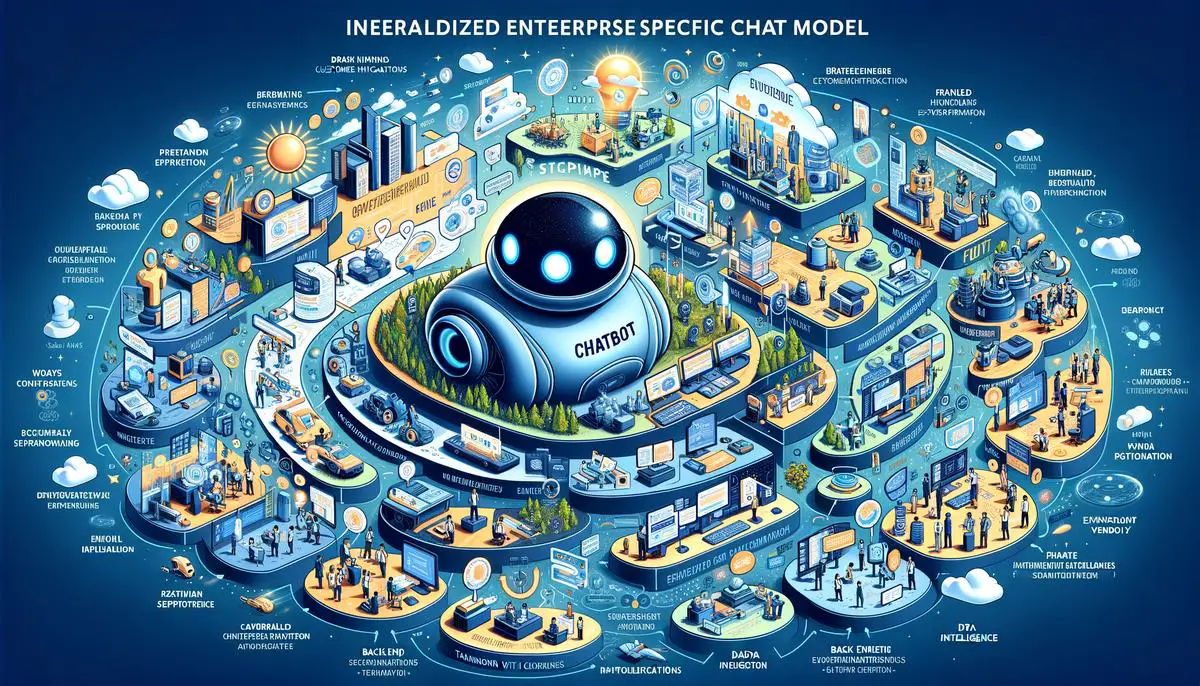In an age where businesses constantly seek the edge to stay ahead, the emergence of Custom Generative Pre-trained Transformers (GPTs) has opened up new avenues for innovation and efficiency. Tailor-made to fit the unique needs of each enterprise, these powerful AI models stand at the forefront of technological advancement, promising to redefine the landscape of business operations. As we explore the significance of Custom GPTs, it becomes clear that their role extends far beyond mere tools of convenience, promising a future where personalized AI solutions drive growth and success.
Understanding Custom GPTs for Enterprise
Table of Contents
Custom GPTs: An Essential Tool for Enterprises
In the rapidly evolving world of artificial intelligence, Custom Generative Pre-trained Transformers (GPTs) are becoming indispensable for enterprises. But what exactly are these, and why are they so crucial for businesses today?
At their core, Custom GPTs are advanced AI models that have been specifically tailored to meet the unique needs and data of a particular organization. Unlike standard GPT models, which are designed for general use, custom versions are trained on specialized datasets. This allows them to understand and generate text that closely aligns with a company’s specific operational, communicational, or analytical requirements.
One of the primary reasons enterprises are turning to Custom GPTs is their remarkable ability to automate and enhance communication. Whether it’s providing customer support through chatbots, generating personalized emails, or creating content for marketing campaigns, these AI models can handle a variety of tasks that were traditionally performed by humans. This not only saves significant time but also boosts efficiency and consistency across all levels of interaction.
Moreover, Custom GPTs play a pivotal role in data analysis and insight generation. Businesses today generate vast amounts of data, deciphering which can be overwhelming. Custom GPTs, trained on a company’s specific datasets, can sift through this information, identify patterns, and offer actionable insights. This capability is invaluable for making informed decisions, understanding market trends, and fostering innovation.
Another compelling reason for enterprises to invest in Custom GPTs is their potential for enhancing product and service personalization. By understanding the nuances of a business’s offerings and customer preferences, these AI models can tailor experiences, recommendations, and interactions in a way that significantly boosts customer satisfaction and loyalty.
However, the benefits of Custom GPTs extend beyond operational efficiency and customer engagement. They also offer enterprises a strategic advantage in a competitive market. By leveraging AI capabilities that are fine-tuned to their specific requirements, businesses can innovate faster, respond more adeptly to market changes, and deliver superior value to their customers.
In conclusion, Custom GPTs represent a paradigm shift in how enterprises leverage AI technology. By offering tailored solutions that cater to the unique challenges and opportunities of a business, Custom GPTs not only streamline operations and enhance customer experiences but also provide a competitive edge in the digital age. As technology continues to advance, the role of Custom GPTs in driving business success is set to become even more significant.

The Process of Developing Custom GPTs
Delving deeper into the realm of Custom GPTs for enterprise use, it’s essential to understand how these sophisticated tools are developed. Custom Generative Pre-trained Transformers (GPTs) are tailored to cater specifically to the nuanced needs of businesses, offering solutions that generic GPT models cannot. The creation process of these bespoke GPTs involves several steps, each crucial for ensuring the models serve their intended purpose effectively.
Initially, the development of a Custom GPT starts with data collection. Enterprises accumulate vast amounts of data specific to their operations, customer interactions, and market trends. This data is the raw material for training the Custom GPT, enabling it to learn from and adapt to the unique context of the business. The quality and comprehensiveness of this data directly influence the effectiveness of the final model.
Following data collection, the next stage is preprocessing. This involves cleaning and structuring the data to make it suitable for training the Custom GPT. Preprocessing might include removing irrelevant information, correcting errors, and organizing the data in a way that’s conducive to learning. This step is critical because it ensures that the Custom GPT learns from accurate and relevant information.
Once the data is prepped, the actual training process begins. Developers use machine learning algorithms to feed the structured data into the Custom GPT, iteratively adjusting and fine-tuning the model based on its performance. This training process is computationally intensive and may require significant resources, but it’s pivotal for customizing the GPT to the enterprise’s specific needs.
An often overlooked yet critical component of developing Custom GPTs is testing and evaluation. After training, the model is rigorously tested to identify any areas where it might not perform as expected. This could involve simulating real-world scenarios or running the model through a series of predefined challenges. Feedback from these tests is used to refine and improve the GPT further.
Lastly, integration marks the final step in the development process. This involves embedding the Custom GPT into the enterprise’s existing systems and workflows. Effective integration is key to ensuring that the benefits of the Custom GPT can be fully realized, from enhancing decision-making processes to automating routine tasks.
Moreover, continuous learning mechanisms are often built into Custom GPTs, allowing them to evolve and adapt over time. As the business environment changes, these models can be updated with new data, ensuring they remain relevant and effective.
Developing Custom GPTs for enterprise use is a complex, multi-stage process that demands careful attention to detail at every step. From data collection and preprocessing to training, testing, and integration, each phase is crucial for creating a model that not only understands the specificities of a business but also contributes to its strategic goals. As these technologies continue to evolve, their capability to drive innovation and efficiency within enterprises will undoubtedly expand, heralding a new era of personalized, data-driven decision-making.

Case Studies: Success Stories with Custom GPTs
Crafting Success: Enterprises and Their Custom GPT Triumphs
Amidst the rapidly evolving landscape of artificial intelligence, enterprises worldwide are turning to Custom Generative Pre-trained Transformers (GPTs) to revolutionize their operations, workflows, and customer engagements. These tailor-made AI solutions are not just a technological upgrade but a strategic asset that propels businesses towards unprecedented growth and innovation. Let’s dive into the transformative journeys of companies across various sectors that have harnessed the power of Custom GPTs to achieve remarkable success.
Revolutionizing Customer Service: The Telecom Giant’s Tale
A leading telecommunications company faced the challenge of managing an overwhelming volume of customer inquiries daily. With the implementation of a Custom GPT, designed specifically to understand and respond to telecom-related queries, the company witnessed a dramatic turnaround. The AI-powered assistant handled over 70% of incoming questions, reducing wait times from minutes to mere seconds and significantly improving customer satisfaction scores. This not only enhanced the customer experience but also allowed human agents to focus on more complex issues, thereby optimizing operational efficiency.
Transforming Content Creation: The Media Mogul’s Journey
In the realm of digital media, a prominent publishing house integrated a Custom GPT to automate and personalize content creation. Tailored to the company’s unique voice and editorial guidelines, this AI-driven approach enabled the generation of articles, news summaries, and personalized reading recommendations at scale. The result? A 40% increase in reader engagement and a substantial growth in subscription rates. This innovation not only positioned the company as a forward-thinking leader in the media industry but also significantly boosted its content production capabilities and audience reach.
Streamlining Operations: The Retail Revolution
A multinational retail corporation implemented a Custom GPT to refine its supply chain and inventory management processes. By analyzing vast amounts of data on purchasing patterns, stock levels, and logistic variables, the custom AI model provided actionable insights that led to a more efficient allocation of resources. This resulted in a 30% reduction in inventory costs and a notable improvement in product availability. The agile and data-driven approach enabled by the Custom GPT has become a cornerstone of the company’s strategy to meet consumer demand more effectively and sustainably.
Enhancing Analytical Capabilities: The Finance Sector’s Success
In the competitive world of finance, an investment firm leveraged a Custom GPT to enhance its market analysis and prediction accuracy. The GPT, trained on a vast dataset of financial records, market trends, and economic indicators, offered deep insights and forecasts with remarkable precision. This strategic advantage allowed the firm to make informed investment decisions swiftly, leading to a significant improvement in portfolio performance and client satisfaction.
Conclusion
These success stories illustrate the transformative potential of Custom GPTs across various industries. By offering solutions that are not only innovative but also highly tailored to specific enterprise needs, Custom GPTs are setting a new benchmark for operational excellence, customer engagement, and competitive advantage. As businesses continue to explore and embrace these advanced AI models, the journey of innovation and success empowered by Custom GPTs is only bound to accelerate.

Navigating the GPT Store for the Best Custom GPTs for Businesses
In today’s rapidly advancing technological landscape, businesses across the globe are seeking innovative solutions to stay ahead. Enter the GPT Store, a marketplace buzzing with opportunities for enterprises to harness the power of Custom GPTs (Generative Pre-trained Transformers). But with an ocean of options, how can businesses pick the Custom GPT that aligns perfectly with their unique needs? This guide aims to steer companies through the GPT Store, ensuring they emerge with a GPT companion that propels them towards success.
Firstly, understanding precisely what your business needs from a Custom GPT is paramount. Do you aim to boost your customer service, revamp your content creation, streamline operations, or enhance analytical capabilities? Pinpointing your primary objective will act as a compass in the vast expanse of the GPT Store.
Upon identifying your needs, the next step involves delving into the technical prowess of available Custom GPTs. Pay close attention to the model’s specifications such as its learning capabilities, adaptability, and the extent of its training data. Models trained on extensive and diverse datasets promise a broad understanding and adaptability, crafting more accurate and relevant outputs for your business tasks.
Another crucial aspect to consider is the compatibility of the Custom GPT with your existing digital infrastructure. Seamless integration into your current systems and workflows is non-negotiable for ensuring productivity and avoiding unnecessary technological hiccups. Look for GPTs that offer flexible integration options or consult with technical experts to ascertain compatibility.
In the GPT Store, customer support and community feedback stand as pillars of insight. Engage with reviews and ratings from other enterprises that have adopted Custom GPTs. Their experiences, covering everything from integration challenges to real-world benefits, can offer valuable lessons and tips. Additionally, a vendor’s commitment to customer support is a telling indicator of the service quality you can expect post-purchase.
Finally, future-proofing your investment is imperative. Opt for a Custom GPT that not only addresses your current needs but also has the capacity for continuous learning and adaptation. The digital landscape is ever-evolving, and selecting a GPT model that can grow and evolve with your business is a strategic move.
In conclusion, navigating the GPT Store requires a blend of self-awareness, technical scrutiny, and strategic foresight. By understanding your business’s core needs, evaluating the technical and integration aspects of Custom GPTs, consulting the community for insights, and focusing on future adaptability, your enterprise can confidently select a Custom GPT that will drive innovation and success. With the right GPT partner, the possibilities for transforming your business operations, customer engagement, and competitive edge are boundless.

The Future of Custom GPTs in Business
Securing Data and Maintaining Privacy with Custom GPT Applications
In the era of digital transformation, data security and privacy remain paramount for enterprises adopting advanced technologies such as Custom Generative Pre-trained Transformers (GPTs). As businesses increasingly rely on Custom GPTs to drive innovation and efficiency, the imperative to protect sensitive information and ensure regulatory compliance has never been more critical.
Central to this concern is the secure training environment for Custom GPTs. Unlike standard models, which are pre-trained on vast datasets sourced from the public domain, Custom GPTs are often trained on proprietary data. This necessitates robust encryption and access controls to mitigate risks of data breaches that could potentially expose confidential corporate strategies, personal customer data, or competitive insights.
Furthermore, the deployment of Custom GPTs introduces complex challenges related to privacy laws and regulations, such as the General Data Protection Regulation (GDPR) in the European Union or the California Consumer Privacy Act (CCPA) in the United States. Enterprises must navigate these regulations carefully, ensuring that their use of Custom GPTs complies with data processing and privacy policies. This involves maintaining transparency with customers about the use of AI in processing their information and providing clear opt-out options for those concerned about privacy.
Another vital aspect of securing Custom GPT applications is the continuous monitoring and updating of the system to protect against evolving cyber threats. Cybersecurity measures, including regular software patches, secure coding practices, and network security protocols, are essential to defend the infrastructure supporting Custom GPTs from external attacks and internal vulnerabilities.
In addition to security, the ethical considerations of deploying Custom GPTs cannot be overlooked. Enterprises must establish ethical guidelines for the development and use of their Custom GPTs, ensuring that the models do not inadvertently perpetuate biases, misinformation, or harmful stereotypes. This responsibility extends to the transparency of AI decisions, where businesses should be able to explain how their Custom GPTs generate outputs, fostering trust among users and stakeholders.
The collaboration between technical teams and legal departments within an enterprise plays a crucial role in addressing these security and privacy challenges. By working together, they can ensure that Custom GPT applications are not only innovative and effective but also secure, compliant, and ethically responsible. This comprehensive approach to implementing Custom GPTs will be critical for businesses seeking to harness the full power of AI while maintaining the trust and confidence of their customers and partners.
In light of these considerations, the future of Custom GPTs in enterprise applications looks promising, yet it is paved with responsibilities. Businesses that anticipate and manage the risks related to data security, privacy, and ethics stand to gain significantly from the adoption of Custom GPT technology. As the landscape of digital technologies continues to evolve, so too will the strategies for deploying these powerful AI tools in a manner that respects and protects individuals’ rights and societal values. With careful planning and execution, Custom GPTs have the potential to revolutionize various sectors, setting a new standard for innovation, efficiency, and responsibility in the digital age.

The transformative power of Custom GPTs in the business realm is undeniable. By bridging the gap between generic AI models and the specific needs of enterprises, they offer a bespoke solution that elevates operational efficiency, customer satisfaction, and competitive prowess to new heights. As businesses forge ahead in this digital era, the strategic adoption of Custom GPTs will undoubtedly mark the difference between those who lead and those who follow. Therefore, embracing these innovations with a forward-thinking mindset is not just an option but a necessity for those aiming to excel in the ever-evolving marketplace.

I’m Dave, a passionate advocate and follower of all things AI. I am captivated by the marvels of artificial intelligence and how it continues to revolutionize our world every single day.
My fascination extends across the entire AI spectrum, but I have a special place in my heart for AgentGPT and AutoGPT. I am consistently amazed by the power and versatility of these tools, and I believe they hold the key to transforming how we interact with information and each other.
As I continue my journey in the vast world of AI, I look forward to exploring the ever-evolving capabilities of these technologies and sharing my insights and learnings with all of you. So let’s dive deep into the realm of AI together, and discover the limitless possibilities it offers!
Interests: Artificial Intelligence, AgentGPT, AutoGPT, Machine Learning, Natural Language Processing, Deep Learning, Conversational AI.





